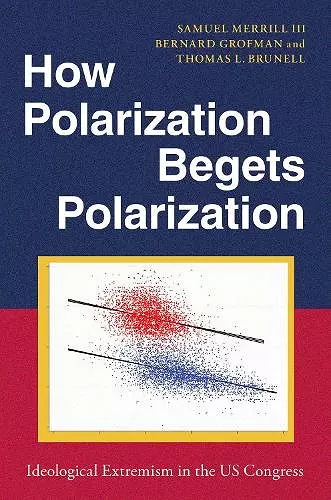How Polarization Begets Polarization
Ideological Extremism in the US Congress
Samuel Merrill, III author Bernard Grofman author Thomas L Brunell author
Format:Paperback
Publisher:Oxford University Press Inc
Published:29th Feb '24
Should be back in stock very soon
This paperback is available in another edition too:
- Hardback£68.00(9780197745229)

This book explores the intricate relationship between congressional polarization and voter behavior, highlighting how party discipline fuels ideological extremes and raises questions about potential reforms or shifts toward a more centrist politics.
In How Polarization Begets Polarization, the author explores the growing divide in American politics, particularly within the U.S. Congress. This polarization is described as a complex phenomenon that intertwines the dynamics within Congress and the electorate, creating a feedback loop that reinforces extreme political positions. The book highlights how political parties exert discipline over their Congressional members and candidates, encouraging them to align closely with their party's ideology. This pressure is further amplified by voters in each district who are faced with increasingly polarized choices, pushing candidates to cater to their party's base rather than the broader electorate.
The author argues that this tight party discipline results in Congressional delegations that are ideologically distinct and increasingly separated from one another. As constituents grow more polarized, often spurred on by activist groups, political parties feel compelled to appeal to their core supporters. This shift leads to a political landscape where parties possess clear platforms—once considered a positive development—yet are now characterized by intense rivalry and conflict, resembling feuding camps rather than collaborative entities.
The book raises important questions about the future of American politics. It considers whether a new reform movement could emerge to replace the current state of discord, akin to the progressive movement's rise following the Gilded Age. Alternatively, it ponders the possibility of a shift in partisan constraints that might allow for a resurgence of centrist politics, or whether a new, overarching issue could create opportunities for cross-cutting alliances. Ultimately, the author leaves readers contemplating the potential pathways for resolution in an increasingly polarized political environment.
Among the leading students of the increasing polarization of American politics, the authors of this important new book lay out a novel institutional perspective on the interaction between polarization in Congress and competition at the district level. * Robert D. Putnam, Research Professor, Harvard Kennedy School and co-author of The Upswing: How America Came Together a Century Ago and How We Can Do It Again. *
Merrill, Grofman, and Brunell have provided the most sophisticated analysis yet of how polarization results from competing demands on candidates to be moderate in order to appeal to the preferences of most voters vs. appealing to their own base for the sake of mobilizing extremists and their moneyed supporters. Their analysis reveals when these competing demands result in convergence to moderate positions, and when they lead to self-reinforcing polarization. * Robert Axelrod, William D. Hamilton Distinguished University Professor, Emeritus *
The literature on legislative polarization identifies numerous contributors, among them party sorting among voters, the influence of party activists, internal legislative organization, and the level of party parity. This book's contribution consists of integrating these disparate forces into a single dynamic model that generates the unhappy implication: polarization begets polarization. * Morris P. Fiorina, Wendt Family Professor of Political Science and Senior Fellow of the Hoover Institution *
Merrill, Grofman, and Brunell's deft theoretical and empirical examination of the complex links between congressional politics and district-level electoral competition delivers a coherent and persuasive account of how institutional processes have sustained and amplified partisan polarization. It is a major contribution to understanding this corrosive feature of present-day American politics. * Gary Jacobson, Distinguished Professor of Political Science, Emeritus *
What's causing US politics to polarize? For a quick answer, blame the other party's appalling behavior! But for the best answer, read Merrill, Grofman, and Brunell's fascinating and sophisticated account of the hidden processes causing these disturbing patterns in American politics. * Gary King, Weatherhead University Professor, and Director of the Institute for Quantitative Political Science, Harvard University *
This is an ambitious book that tackles the ever-present question of why American politics has polarized-and continues to polarize today. The authors demonstrate how electoral and partisan incentives can propel partisans-from lawmakers to candidates and activists-to champion policies that increasingly diverge from the political center. An essential contribution to scholarship and debates about polarization and how it might one day be tamed. * Sarah Binder, George Washington University and The Brookings Institution *
The authors' presentation is sometimes challenging, but the resulting analysis makes this relatively short book very valuable for understanding American political polarization. Recommended. * Choice *
Merrill, Grofman, and Brunell have constructed a useful model of congressional voting that can account for the growing ideological conflict observed among members of Congress. Their analysis is presented in accessible language, with technical details placed in supplemental appendices, and demonstrates a strong grasp of contemporary political realities. The insights and implications of their research can be fruitfully applied to other institutions or offices as well. * David A. Hopkins, Congress & the Presidency *
Merrill, Grofman, and Brunell have constructed a useful model of congressional voting that can account for the growing ideological conflict observed among members of Congress. Their analysis is presented in accessible language, with technical details placed in supplemental appendices, and demonstrates a strong grasp of contemporary political realities. The insights and implications of their research can be fruitfully applied to other institutions or offices as well. * David A. Hopkins, Congress & the Presidency *
ISBN: 9780197745236
Dimensions: 226mm x 163mm x 33mm
Weight: 295g
200 pages